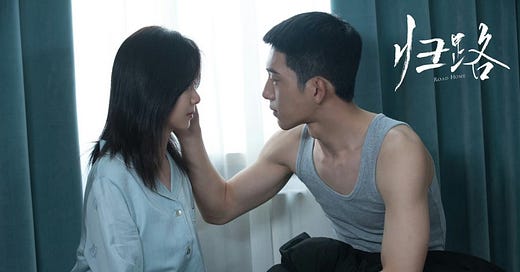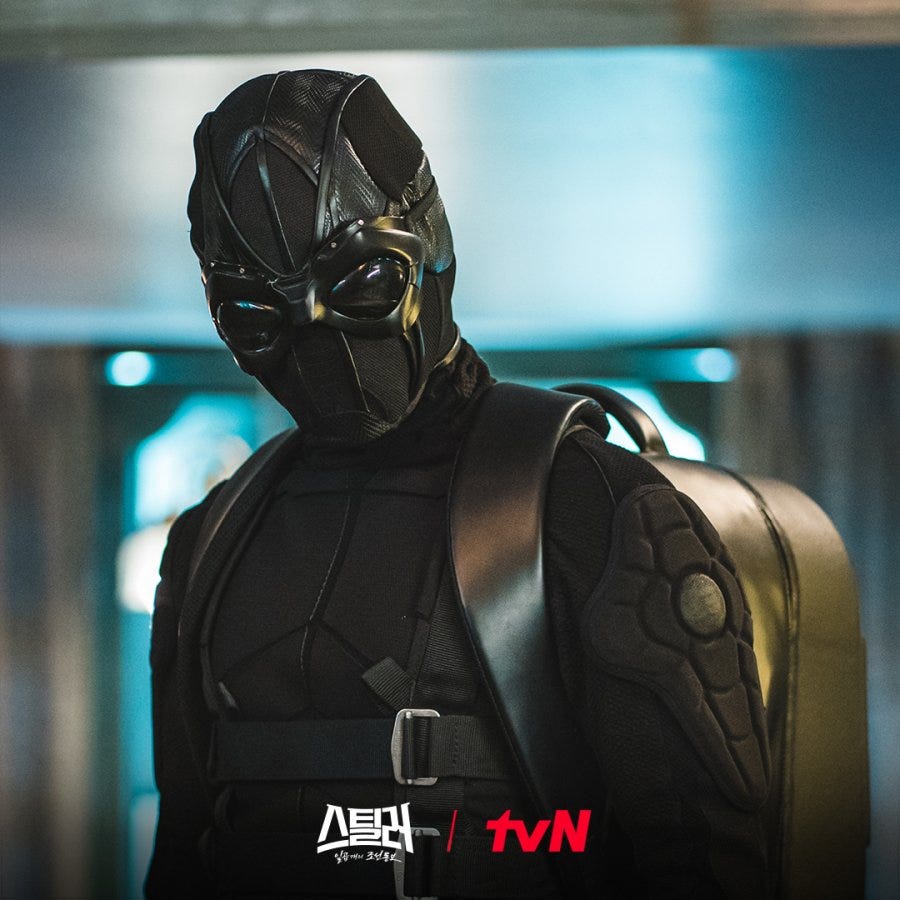Do I really need to see Jing Boran change a light bulb? That’s just one of many niggly questions that comes to mind as I plod my way through Road Home with a gnawing itch to drop it. It’s a lovely angle of him to be sure (as any would be) and perhaps the audience has missed the point that Tan Songyun’s character Gui Xiao is absolutely enamoured with Lu Chen when she fixes her adoring eyes on his strapping figure as he does what most men worth their salt can do at the drop of a hat. When Li Xian changes light bulbs at the boarding house in Meet Yourself, there are multiple reasons for it. It tells us something about the ubiquity of his character. It shows that he’s a handy fellow. It was yet another bit of confirmation that he was the heart and soul of his village — a one man economic engine. But when Lu Chen is swapping out light fittings, it feels like the director and/or script writer don’t really have any idea of how to integrate all of the elements around the romance. Which is the general feeling I get as the “story” progresses. It’s like watching a reality travelogue that I didn’t sign up for. The thing is, the light bulb scene is meaningless here because it doesn’t tell us anything we don’t already know about Lu Chen. The guy is a bomb disposal expert. What’s a light bulb when there’s an explosive device with a complex web of wiring about to go kaboom? Road Home is a show that should be watched at 1.5 x or 2 x speed or not at all. Which leaves me with a conundrum: Jing Boran’s alluring sonorous vocals gets lost in translation.
Slice-of-life dramas are much harder to do than one might expect. The South Koreans are masters at it because they exploit the format’s limitations with a high degree of skill. A good writer is well aware that the point of such stories are the characters. In my opinion only two C dramas have done this with flying colours — Ordinary Greatness and Meet Yourself — because 1) the big picture is seen from the perspective of multiple characters; 2) their stories intersect and converge at different points in its unfolding. On paper, Road Home should have the potential to be equally effective but the mistake is putting an obvious conflict-free romance at the centre of the story. Except for the godson, none of the other characters have interesting arcs of their own. Worse still they feel disconnected. Their sole purpose is to dance around the leads and support their journey as they inevitably pair up. I’m about 15 episodes in and I still don’t find Gui Xiao a compelling character in her own right. Lu Chen gets to do all the exciting cop stuff while she panics around in the dark wondering if he’s going to live to see another day. It’s by the numbers. There’s no curiosity about any of the characters and how they get to the point that they do. 30 episodes is just too long for a show where there’s so little build up or suspense. By the time the leads tell us that they’re tying the knot, most of the key reveals have come and gone.
It’s a mistake to think that slice-of-life dramas have no plots. (Or meander aimlessly without one) They do. And the really good ones do such a good job of juggling multiple threads that those who watch that the balancing act is actually easy. Part of the problem too with Road Home is that Lu Chen’s SWAT activities are far more interesting than anything else in the show. Consequently I inevitably come to this conclusion about these types of police procedurals — they are veiled recruitment propaganda. Ad campaigns for law enforcement because no one in the their right mind would sign up for SWAT and EOD without overt prodding and/or flag waving. It’s one thing to insert propaganda in a crime show, it’s another in a romance. It’s deadly.
Still it would be a pity to give this up because Jing Boran is just such a great romantic male lead. Even as a cop, he’s every inch the part. Increasingly, he and the scenery are the only two things worth gawking at.
Much more fun and gleeful is Stealer: The Treasure Keeper. It’s no heavyweight offering but it doesn’t pretend to be one. It’s a good-natured romp after the fashion of Marvel’s superheroes. Joo Won (as I’ve mentioned in the recent podcast) is the titular character Hwang Dae-myung, an idealistic vigilante cat burglar who steals national treasurers from the corrupt rich by night and works as a bootlicking, beleaguered public servant by day. He is nicknamed “Skunk” by the cops — a special team dedicated to catching antiquity smugglers. The team leader (Jo Han-chul) is frustrated by the fact that his hands are tied by the antics of the baddies and soon seeks the help of the elusive Skunk who is already doing his patriotic bit. I’m not going to say or pretend that this is the best thing I’ve seen all year but it’s a wholesome lark. While the target demographic is much younger than what I am, I’m seldom wearied by the antics of the characters. While it does come off a bit cartoony in places, it doesn’t drag. Everything moves fast. (Unlike Season 2 of Taxi Driver)
Stealer is obviously a call back to Healer. Skunk is supported by a fabulously wealthy Q-type ahjumma who is more upbeat and far less dour than John Cleese or Desmond Llewelyn. She’s a hoot and has far better chemistry with Joo Won than the show’s main female cop (Lee Joo-woo). Like most K dramas of this kind, the good guys have to find a way to work together against the show’s Big Bad (Lee Deok-hwa) who is in search of some old Joseon coins which is the key to something else far more significant. In this regard, the show does give off Indiana Jones vibes.
Bora! Deborah, on the other hand, is a tough one to pin down. I don’t know what to make of it after a couple of episodes. Or whether it’s an ongoing concern. There are aspects of an old-fashioned rom com hidden in the weeds but there are elements about it that come across cliche and cringey. I think it’s what I’ve been struggling with lately in K rom coms. Characters act the way they do because the script wants them to. The writer has the story beats laid out in a particular way in an effort to differentiate this script with others which makes it more obvious that it’s following a template. On the other hand, the dating advice is often insightful/relevant and Yoo In-na is always adorable to watch.





I had the same problem with Road Home. Despite watching it at 2x speed, i still had to fast forward so many stories and I didn't find the swat bit compelling. I don't know why the show got made. Hopefully there's a better compelling show out there for Jing Boran because the guy can deliver.
Bo Ra is actually delightful once you got past the first two episodes (at least for me). The leads went from antagonistic to becoming friends. She is chaotic and kind of had her head stuck somewhere in la la land. He is very rational, is emotionally stubborn and prideful. They developed a camaraderie based on shared experience maybe her more than him.
You can try watching Dr. Cha and the Good Bad Mother if you are not already doing so. They are one of the good ongoing shows right now.